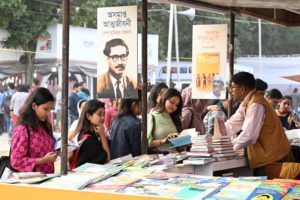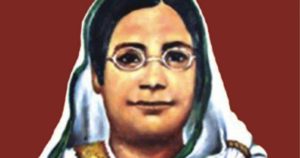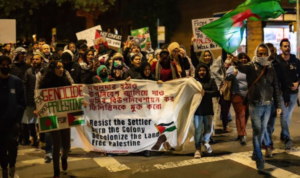Bollywood’s Role in the Oppression of Kashmir
A shot from Kashmir Ki Kali (1964) vs. an image from Kashmir in 2019. Danish Siddiqui / Reuters
Bollywood’s Role in the Oppression of Kashmir
BY ZARA KABIR
Bollywood is glitzy and glamorous, the all-encompassing pinnacle of the South Asian experience. Many of us have grown up watching Bollywood, some of us learning Hindi in addition to our native Bangla. But, beyond the fame and fortune, lies the grim reality of an industry that has aided in the subjugation and oppression of Kashmir for more than 50 years.
Indian cinema’s love affair with Kashmir dates back to the ’50s and ‘60s when the region quickly became a prime filming location following India’s independence. Kashmir’s natural rural beauty, from lush green hills to picturesque snowy peaks, was the perfect romantic backdrop. A sharp contrast from urban Indian cities, Kashmir was seen as ‘paradise’, ‘pastoral’ and ‘pure.’
“Movies like Kashmir ki Kali” (1964), “Jab Jab Phool Khile” (1965), “Roti! (1974), “Kabhi Kabhie” (1976), “Noorie” (1979) and “Silsila” (1981) were all set and shot in the hills and valleys of Kashmir. Filmmakers took full advantage of the untouched beauty of the region, painting an idyllic image that left a lasting impression on the minds of Indian viewers.
What was often lacking from these films, however, were Kashmiris themselves. Kashmir was only seen and utilized as a film set, with the stories of everyday Kashmiris majorly absent from Bollywood movies. And when they were on screen, they were depicted as simplistic, naive and in need of Indian modernity,” according to Hafsa Kanjwal, an assistant professor of South Asian History at Lafayette College. “[Kashmiri] Muslimness is either erased completely or it’s seen as being something that can’t exist peacefully with Indian secularism or Indian Hinduism.”
Most of the time, the main heroes on the screen were Indian men who had escaped from the city and found themselves a chaste innocent Kashmiri bride. This notion persists today it appears. Far-right leaders and supporters alike publicly celebrated and shared their desires to marry gori or “fair-skinned,” Kashmiri girls when Article 370 was scrapped in 2019, revoking Kashmir’s special status.
The fetishistic othering of Kashmiri women, added Kanjwal, is intentional. Similar to the European fascination of the Oriental and how East Asian women were often seen as exotic, the “Indian cultural apparatus has attempted to create this image of Kashmiri women … [as a] part of the colonization and settler colonization” of Kashmir.
By contrast, Kashmiri men have been dehumanized as barbarians and terrorists by many in India and Bollywood has helped bolster that image as well. Until the rise of insurgency and separatist movements in the early 90’s, Bollywood had avoided any political narratives when it came to the Muslim majority region. Suddenly, they decided to take on a new approach: Kashmiris, who had never played a major role in plotlines of earlier films, were suddenly cast in front of the camera as antagonists.
In movies like ‘Roja’ and ‘Dil Se’, the Indian hero returns, but that time, he wasn’t just looking for a village wife; he was also a patriot of his country, defending it and the poor Kashmiri women from extremists.
The reality of Kashmir is that its population lives under heavy militarization and a lack of public freedoms. Kashmiri politicians, journalists and activists live under house arrest, at best. Indian security forces occupy the region, arresting, torturing and killing Kashmiris with impunity. Communications are regularly disrupted, especially since the unprecedented lockdown that followed the revoking of the Article 370 in 2019, that completely cut all communications between Kashmir and the outside worlds. Evidence of mass human graves has also been found by Human Rights Watch, a result of forced disappearances and extrajudicial killings.
Wen the UN released a 49-page report about deteriorating conditions and human rights abuses in Kashmir, it cited both India and Pakistan to blame. At the suggestion of an investigation into issues in Kashmir, India rejected the step, claiming that the report was false and violated India’s sovereignty. Pakistan, for its part at least, welcomed an investigation.
In recent years, India’s PM Modi invited Indian filmmakers to return to Kashmir, promising security and amenities. This may be an attempt to further establish an Indian presence in the region.
Assistant Professor Kanjawal said, “The idea is to strengthen, uphold and reclaim India’s territorial cultural-historical claims on Kashmir. All of this new filmmaking, before it was taking place in the context of colonial occupation. Now, it’s also taking place in the context of settler colonization.”
The Indian Mother Theresa said, “Only humanity will lead us to unity, and unity will lead us to peace.”
The Bengali Rabindranath Tagore said, “You cannot cross the sea merely by standing and staring at the water.”
Read More
The Legacy of Boi Mela
Every year in February, the month-long national book fair welcomes...
Read MoreMillennial Amma: How to Explain a Global Crisis As a Parent
Rumki Chowdhury shares tips for how to talk to children...
Read MoreBegum Rokeya’s Millennials
A tribute to a pioneering Bengali feminist writer, educator and...
Read More



